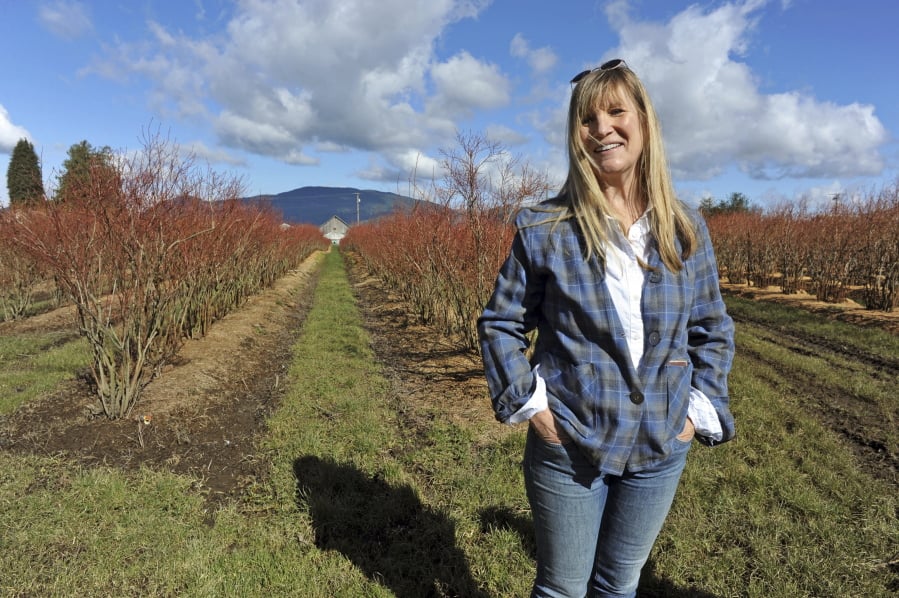MOUNT VERNON — From taking over an heirloom berry farm to starting a flower farm from scratch, some Skagit Valley women are thriving in family farming.
These women are proud owners of some of the Skagit Valley’s small, organic and sustainable farms, and their passion for what they do is clear. For them it’s about flavor and nutrition, beauty and sustainability.
And while farming remains a field largely dominated by men, these women say they’ve felt welcomed into the profession and have found their own niches.
“The small Skagit Valley farm community … it’s a really open community and the other farmers have really welcomed us,” said Susan Soltes, owner of Bow Hill Blueberries. “This is a great valley for farming on this scale.”
Amy Frye, owner of Boldly Grown Farm, said she sees more men in areas such as farm equipment sales, and more women participating in events, particularly those focusing on sustainable agriculture.
Frye, Soltes and Jello Mold Farm owner Diane Szukovathy are just a few of hundreds of women who farm in Skagit County, according to U.S. Department of Agriculture data that tallied 708 women who were farm operators in the county as of 2012.
Here’s a look at what drives them:
AMY FRYE, BOLDLY GROWN FARM
The Burlington produce farmer said it was fluke she got into agriculture. While studying environmental studies at the University of British Columbia, Frye stumbled upon a tiny university farm tucked into the woods.
She worked in various roles on the farm, eventually meeting her husband there. After nine years there, Frye and her husband made the move to Skagit County to start their own farm.
They lease land from Viva Farms and grow predominantly storage crops — produce that is for sale in the typical offseason.
Frye said farming connects to her environmental values.
“Agriculture has been a lot of the problem in terms of our environmental issues,” she said. “But it also has potential to be a big part of the solution in terms of creating habitat and regenerating soil.”
In the future, Frye said she and her husband hope to buy their own land where they will have more freedom to incorporate habitat restoration.
“We’d like to add grains and poultry into our crop rotation and mimic nature in the sense that diversity equals resilience,” she said.
Frye said she primarily manages the farm.
“I love being outside,” she said. “I love the flexibility and being my own boss.”
SUSAN SOLTES, BOW HILL BLUEBERRIES
Soltes and her family purchased Bow Hill Blueberries from the Anderson family, who established the farm.
The six-acre farm was first planted in 1947. Those same plants remain in place today, producing heirloom berries that are smaller, sweeter and more nutritious than varieties found in grocery stores, Soltes said.
“We think that’s really cool,” she said. “We were lucky to inherit what they planted here.”
Soltes said her family’s first move after purchasing the farm in 2011 was to go organic.
Each summer about 30 employees hand pick and process the blueberries. Many of those berries are frozen, and used by seven year-round employees to create products including juice, jam, ice cream and pickled berries throughout the rest of the year.
Soltes said she realized soon after purchasing the farm that it would take more than selling fresh berries at farmers markets to keep the business afloat.
“Pickled blueberries were the first thing we did and it’s an award winner. It won a Good Food Award,” she said of the sweet and sour delicacy she now sells to specialty food markets throughout the United States.
Yet she said the best product remains the berries straight off the plant.
“The best thing is coming out in the mornings and eating the fresh berries when they have dew on them. That’s one of the things Catherine Anderson, one of the former owners, told me … and gosh was she right,” Soltes said.
DIANE SZUKOWATHY, JELLO MOLD FARM
Szukovathy said the name of her business relates to her past as an artist. In the early 90s, she covered an artist co-op building with gelatin molds.
When she started a landscaping business in the 90s, she named it Jello Mold because she said her last name was too complicated to use as a business name.
Szukovathy said her work in landscaping is what led her to pursue flower farming.
“I fell in love with botany,” Szukovathy said. “My kind of farming is a lot about beauty.”
She and her husband moved to Skagit County in 2001 with dreams of starting a cut-flower farm. They set up shop on seven acres in Mount Vernon and began building up their farm, picking up landscaping jobs to pay for construction as they went.
Szukovathy said they built the farm with sustainability in mind — it’s certified salmon-safe and they plant about 80 kinds of flowers both to mimic the variety found in nature and to diversify their crops.
In the male-dominated world of agriculture, flower farming stands out as exception, Szukovathy said.
“Flower farming is much more female than any other kind of farming,” she said.
Nearly 20 years after opening Jello Mold Farm, Szukovathy said they have run out of land on which to build and sell nearly all of their inventory to high-end bridal designers and floral shops.
She said they’ve tapped into wedding trends by growing foliage and “woody” plants such as raspberry vines.
“It’s both glamorous and hard work,” Szukovathy said. “I love that combination.”



